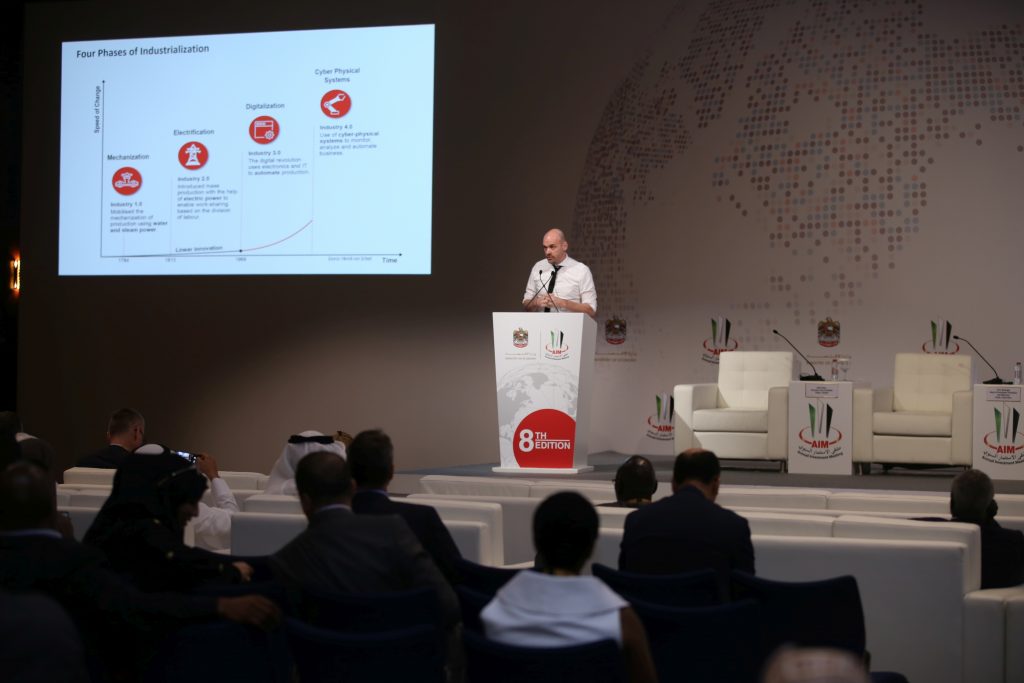Dubai – Investment in education is the key requirement in order for a country to be competitive in so-called industry 4.0, i.e. economic activity straddling the digital, physical and virtual realms, as put by the term’s coiner, Switzerland’s Henrik Von Scheel. “Your phone has more resources than the spaceship that went to the moon,” he said this Tuesday (10) at the Annual Investment Meeting (AIM), a conference on foreign direct investment (IED) taking place in Dubai, United Arab Emirates. “The virtual world is real in the digital world, which is real in the physical world,” he said.

Scheel delivered a lecture and sat in two panels. Education was named by virtually all speakers as a crucial ingredient for a country to transition into industry 4.0. “It takes a high level of educated people to maintain it,” said Lee Gibson Grant, who specializes in cryptocurrency and blockchain technology. “People need education and training before they can perform a new type of work,” he added.
The widespread consensus is that industry 4.0 will render traditional jobs obsolete through advances in automation, robotics, biometrics, artificial intelligence and other technologies. A good example in our days is the development of driverless vehicles, which can directly affect taxi drivers and drivers in a broad sense. This means people will need to be trained to do different types of work. “Jobs will become extinct, but competencies won’t,” said Saudi Arabia’s Fatima Al Arabi, a manager and investment consultant and the founder of Alaf Capital.
Along similar lines, Antti Aumo, the executive vice president with agency Invest in Finland, discussed his own country: “While Finland has a high-technology industry, 100 years ago it was a poor, predominantly agricultural country. Over time, we educated our population, and we did it well,” he said.
This doesn’t mean the Scandinavian nation’s adaptation to the new era was trouble-free. According to Aumo, Finland was a latecomer in moving into industry 4.0, due to its high production costs, and it wound up losing industries to other countries.
“We lost 200,000 jobs in traditional industries over the past few years due to costs, and this was in a country with a population of 3.5 million,” he said. Industry 4.0 is also an effect of globalization, so in addition to the integration of platforms and technologies, it creates competition among countries that want to attract it. “This is a huge opportunity for emerging countries,” said Scheel.
Portugal is one such country. “Portugal didn’t realize that any of the three industrial revolutions were happening until years afterwards. Now, we’ve decided to be part of the fourth one,” said João Vasconcelos, a former secretary of State for Industry with the Portuguese government and currently a senior adviser with Clearwater International. He was responsible for a program focusing on industry 4.0 and startup businesses in Portugal. “That was important in order to attract investment as well as maintain our traditional industries,” he said.
The deputy executive secretary at the United Nations Economic Commission for Latin America and the Caribbean (Eclac), Mario Cimoli said governments cannot stick to the usual policies when it comes to getting people to invest in industry 4.0. “We need new educational policies, up-to-date platforms in information technology, communication and regulation,” he said.
Jake Zeller, a partner at AngelList, an investment platform targeting startups, agreed: “Invest in education and put in place regulations that are favorable to startups.”
World Bank

Earlier in the day, World Bank senior economist for Investment Climate Peter Kusek presented key results of the latest Global Competitiveness Report. He revealed that investors responding to a poll said relevant factors for countries to attract investment are a good business environment and political stability.
“Foreign direct investment (FDI) is conducive to development, as well as the primary source of external funding for many developing countries,” he asserted. “FDI is beneficial to both the source and recipient economies,” he said.
The report also concluded that investors in developing countries are likelier to invest in higher-risk places. As a rule of thumb, however, investors look for legal safety, freedom to transfer funds and predictability, but oddly enough, fiscal incentives are no longer relevant when weighing risk against return.
“These conclusions apply to all countries,” Kusek told ANBA. “The investment a country must attract, however, is that which seeks efficiency, exports and innovation, for those will help development and diversification, and add value to the economy,” he said.
Translated by Gabriel Pomerancblum




